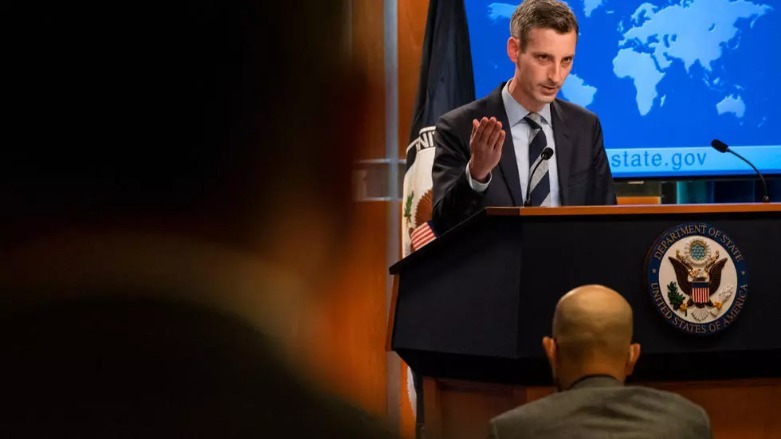US: ‘Not too late’ to renew Iran nuclear accord, despite E-3, Israeli pessimism

WASHINGTON DC, United States (Kurdistan 24) – Speaking to reporters on Tuesday, State Department Spokesperson Ned Price, once again, affirmed that the US still sought to revive the 2015 Iranian nuclear accord, formally known as the Joint Comprehensive Plan of Action (JCPOA), which Donald Trump left in 2018.
Price’s reaffirmation of the US commitment to the long-stalled negotiations comes as a bit of a surprise, as several, independent parties have expressed their skepticism about prospects for renewing the accord.
They include the three European countries, known as the E-3—Britain, France, and Germany, while Israeli media has reported that a renewal of the JCPOA was not likely, at least for now, according to what US President Joe Biden has told Israel’s Prime Minister.
Similarly, Secretary of State Antony Blinken on a recent visit to Mexico also voiced a pessimistic view.
However, on Tuesday, Price expressed a more positive, upbeat perspective. The reason for the shift was not obvious.
Earlier Pessimism: Israel, Europe, Blinken
The pessimism last week about renewing the JCPOA was clear and came from multiple sources.
“A new nuclear deal” with Iran “is off the table and will not be signed in the foreseeable future,” the Israeli press reported. “This was the message conveyed to Prime Minister Yair Lapid in his recent conversations with US President Joe Biden and other administration officials.”
In a similar vein, the E-3 issued a joint statement on Saturday strongly critical of Iran’s latest negotiating position. Notably, Saturday’s statement was the first time that the E-3 had voiced a negative stance on prospects for renewing the JCPOA.
The signatories include the two most powerful countries in the European Union (EU)—France and Germany. Thus, their statement, implicitly, constitutes a rebuke to EU Foreign Policy Chief, Josep Borrell, who has treated a renewal of the JCPOA as a pet project and who has repeatedly promulgated overly optimistic statements about prospects for a renewed deal as a way of pressuring the US and Iran into concluding one.
Read More: US affirms ‘gaps remain’ for reviving Iran nuclear accord
US Secretary of State Antony Blinken was the third party to express pessimism about renewing the JCPOA over the past week. While he was visiting Mexico on Monday, reporters asked him about that issue.
“Iran seems either unwilling or unable to do what is necessary to reach an agreement,” Blinken responded. “They continue to introduce extraneous issues to the negotiation that make an agreement less likely,” he continued, adding, “What we’ve seen in the last week is a step backward away from the likelihood of near-term agreement.”
The Key Obstacle: IAEA Investigation
The new Iranian position that has precipitated the broad pessimism is its demand that the International Atomic Energy Agency (IAEA) end its investigation into outstanding issues regarding Iran’s nuclear program.
The IAEA inquiry is not related to the JCPOA. Rather, it is a function of Iran’s adherence, at least formally, to the Non-Proliferation Treaty (NPT.)
In 2019, the IAEA discovered traces of uranium at three undeclared sites in Iran. Such a discovery implies that Iran was conducting covert nuclear work. The IAEA has asked Tehran to explain those traces, but it has not done so, and it now demands that the IAEA close its inquiry as a condition of Iran’s return to the JCPOA.
However, that condition is not acceptable to the US or the Europeans. They have refused to pressure the IAEA to accommodate Tehran.
Price: Reaching Out to Iran
The Biden administration has never been prepared to give Iran a deadline for reaching an agreement on reviving the JCPOA. Critics complain that position merely gives Iran room for delay, maneuver, and manipulation.
On Tuesday, Price reiterated that there is no deadline, as far as the US is concerned, for renewing the JCPOA—or at least that deadline has not yet been reached.
“It is not too late to conclude a deal,” Price stated, before adding, “As we’ve consistently said, as long as we believe that a mutual return to compliance with the JCPOA would be in America’s national security interest, that is a diplomatic objective we will continue to pursue.”
That point is a familiar one from Biden administration officials, and it is generally followed by a one-sided argument: whatever the level of Iran’s malign behavior is now, it would be much worse if Iran were to become a nuclear-armed state.
Price made that point on Tuesday. “Every single challenge we face from Iran’s ballistic missile program to its support for proxies and terrorist groups, to its support for Russia” would become “all the more difficult, if Iran has the perceived impunity that would come with a nuclear program.”
The perspective of critics, however, is the opposite. For example, the head of Israeli intelligence, David Barnea, while visiting Washington last week, told reporters, “Hundreds of billions of dollars would flow to Iran,” following the revival of the JCPOA. “The money would serve to strengthen terror groups” that attack Israel, including Lebanese Hezbollah, Hamas, and Palestinian Islamic Jihad.
Denouncing a renewed deal as a “strategic disaster,” Barnea warned that the Iranians would also “accelerate their vision of a ‘Shia crescent’ running from their border with Iraq to the Mediterranean, strengthening the Houthis in Yemen and pro-Iranian militias in the region.”
